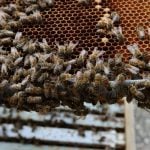
Tag Archives Beekeeping

Canadian beekeepers warn of advancing tropilaelaps mite

CFIA rejects beekeeper proposals on U.S. packaged bees
The CFIA was unconvinced that suggested measures could offset the risk of importing bee pests along with bulk bee replacement stock

Mapping tool to stop accidental spraying now available across Prairies
Organic farmers and beekeepers hope FieldWatch can prevent costly accidents — but buy-in is still building

New bee health product receives federal approval
Hops provide the key ingredient for a new bee immunity tool approved for beekeeper use in Canada

Prairies’ pollinators play a crucial role
It’s estimated pollinators, mainly bees, increase the production of numerous species of crops by as much as 75 per cent

More ‘murder hornets’ found in B.C., Washington
Findings suggest some were able to overwinter

Beekeepers co-operating with farmers
Top Saskatchewan apiarists talk about farmers, bee habitat and neonic bans

Les Henry: Finding a place for bees
Syngenta’s Operation Pollinator: a good fit for an awkward piece of land

What’s up honey?
The truth about honeybees’ importance in North America. Hint: it’s less than you think

Still going strong after 50 years
Leafcutter bee pioneers ‘still learning’ after all that time


